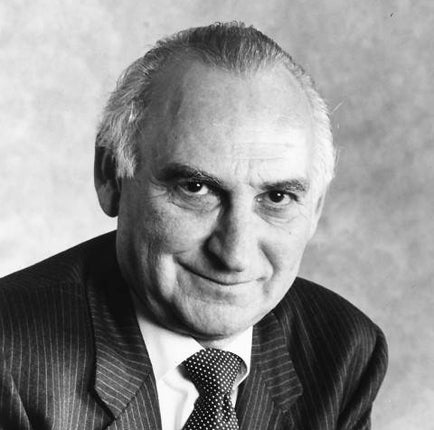Sir Frank Lampl: Holocaust survivor who later became chairman of the construction company Bovis

Your support helps us to tell the story
From reproductive rights to climate change to Big Tech, The Independent is on the ground when the story is developing. Whether it's investigating the financials of Elon Musk's pro-Trump PAC or producing our latest documentary, 'The A Word', which shines a light on the American women fighting for reproductive rights, we know how important it is to parse out the facts from the messaging.
At such a critical moment in US history, we need reporters on the ground. Your donation allows us to keep sending journalists to speak to both sides of the story.
The Independent is trusted by Americans across the entire political spectrum. And unlike many other quality news outlets, we choose not to lock Americans out of our reporting and analysis with paywalls. We believe quality journalism should be available to everyone, paid for by those who can afford it.
Your support makes all the difference.Sir Frank Lampl, a Holocaust survivor and Cold War prisoner, went on to become chairman of Bovis, turning it into one of the world's leading construction companies. Lampl epitomised man's desire to survive and succeed in the face of adversity and earned a worldwide reputation as one of the industry's leading figures.
Born in Brno, Czechoslovakia, in 1926, to landowners Otto and Olga, Frank William Lampl was a teenager when the Nazis invaded in 1938. He worked as a slave labourer at the underground BMW factory in Munich. During the Second World War he was a prisoner in the concentration camps at Terezin, Auschwitz and Dachau.
Following the Nazis' defeat, Lampl returned to Czechoslovakia, only to be imprisoned during one of the Communist regime's purges, and denounced as a "bourgeois undesirable". He worked for more than three years in the uranium mines of Jachymov. Following Stalin's death in 1953 Lampl was released under a general amnesty. Given a choice between mining and construction, he entered the latter. Over the next decade, he was a model employee; without actually joining the Communist Party, he rose to become managing director of the Pozemni Stavby Zavod Opava state-owned construction company, while studying at Brno Technical University. "I always tell ambitious young people to be careful how they treat their colleagues," he later recalled. "If your subordinate does not like you, you won't succeed. Most success depends on colleagues, on the team... People at the top can have large egos, but you must never say 'I': it's always 'we'."
In 1968, the tanks entered Czechoslovakia to crush the Prague Spring; Lampl was, by then, trusted sufficiently to travel abroad. He and his wife Blanka left with one suitcase to visit their son, Thomas, who was studying at Oxford University. They did not return.
The couple settled in Clapham, south London and Lampl soon found work in construction before joining Bovis as a foreman bricklayer in 1971, aged 42. He quickly rose to project manager, and on the successful completion of his first project, in Luton, to the astonishment of many he secured the contract to refurbish Pergamon Press after a cold call to his compatriot, the Pergamon owner Robert Maxwell.
In 1974, the year he became a British citizen, Lampl became managing director of Bovis Construction Southern and executive director of Bovis Construction Limited and oversaw the company's successful forays into the booming Middle Eastern and British property markets of the 1970s and '80s. This led to the formation of Bovis International in 1977, with Lampl as chief executive and, a year later, managing director. In 1985, he became a board member of P&O, at that time the holding company of Bovis, and in 1989 chairman of Bovis Construction Group, a post he held until 2000.
In the 1980s Bovis became synonymous with the big-bang building boom in London, and the company's introduction of management skills imported from the US construction industry facilitated rapid completion of the most complicated projects, such as projects at Canary Wharf, including 1 Canada Square. Under Lampl's stewardship, Bovis won a number of high-profile contracts, including the development of EuroDisney outside Paris, the Atlanta Olympic Games and the Petronas Towers in Kuala Lumpur, the world's tallest building for six years. Following the Velvet Revolution in Czechoslovakia in 1989, Lampl set up an operation in his former home town Brno, while Bovis contributed to several major Czech projects. In 1984 and 1986 Bovis won the Queen's Award for Export.
In 1999, Lampl oversaw the sale of Bovis to the Australian firm Lend Lease before retiring in 2000, retaining the position of life president and continuing to act in a consultancy role. By then, Bovis had a presence in 40 countries.
In 2009, Lampl suggested that a reason for his success was his experience of working as a labourer. "That kind of experience is a great advantage, particularly in construction, because it helps you understand what motivates people," he said. "If you come through the ranks... you have a much better feel for what's happening on-site."
Martin Childs
Frank Lampl, businessman: born Brno, Czechoslovakia 6 April 1926; Kt 1990; married 1948 Blanka (deceased 2001; one son), 2002 Wendy; died 24 March 2011.
Join our commenting forum
Join thought-provoking conversations, follow other Independent readers and see their replies
Comments